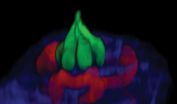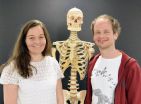(Press-News.org) Scientists have for the first time captured live images of the process of taste sensation on the tongue.
The international team imaged single cells on the tongue of a mouse with a specially designed microscope system.
"We've watched live taste cells capture and process molecules with different tastes," said biomedical engineer Dr Steve Lee, from The Australian National University (ANU).
There are more than 2,000 taste buds on the human tongue, which can distinguish at least five tastes: salty, sweet, sour, bitter and umami.
However the relationship between the many taste cells within a taste bud, and our perception of taste has been a long standing mystery, said Professor Seok-Hyun Yun from Harvard Medical School.
"With this new imaging tool we have shown that each taste bud contains taste cells for different tastes," said Professor Yun.
The team also discovered that taste cells responded not only to molecules contacting the surface of the tongue, but also to molecules in the blood circulation.
"We were surprised by the close association between taste cells and blood vessels around them," said Assistant Professor Myunghwan (Mark) Choi, from the Sungkyunkwan University in South Korea.
"We think that tasting might be more complex than we expected, and involve an interaction between the food taken orally and blood composition," he said.
The team imaged the tongue by shining a bright infrared laser on to the mouse's tongue, which caused different parts of the tongue and the flavour molecules to fluoresce.
The scientists captured the fluorescence from the tongue with a technique known as intravital multiphoton microscopy. They were able to pick out the individual taste cells within each taste bud, as well as blood vessels up to 240 microns below the surface of the tongue.
The breakthrough complements recent studies by other research groups that identified the areas in the brain associated with taste.
The team now hopes to develop an experiment to monitor the brain while imaging the tongue to track the full process of taste sensation.
However to fully understand the complex interactions that form our basic sense of taste could take years, Dr Lee said.
"Until we can simultaneously capture both the neurological and physiological events, we can't fully unravel the logic behind taste," he said.
INFORMATION:
Rather than slowing down, ants speed up in response to a higher density of traffic on their trails, according to new research published in Springer's journal The Science of Nature - Naturwissenschaften. When the researchers increased the supply of food by leaving food next to the trail, ants accelerated their speed by 50 percent. This was despite more than double the density of traffic.
When food increases in supply, more forager ants are sent out to carry it back to the nest. With this increase in ant density, the number of encounters between outbound and incoming individuals ...
The ability of materials to conduct heat is a concept that we are all familiar with from everyday life. The modern story of thermal transport dates back to 1822 when the brilliant French physicist Jean-Baptiste Joseph Fourier published his book "Théorie analytique de la chaleur" (The Analytic Theory of Heat), which became a corner stone of heat transport. He pointed out that the thermal conductivity, i.e., ratio of the heat flux to the temperature gradient is an intrinsic property of the material itself.
The advent of nanotechnology, where the rules of classical ...
Scientists at The University of Manchester have made an important finding that could help develop an early test for kidney disease.
Dr Rachel Lennon from the Wellcome Trust Centre for Cell-Matrix Research has been studying why some people are more susceptible to kidney disease because of their race and gender.
She explains: "It's well known that impaired kidney function is more common in Afro-Caribbean individuals compared to those from a Caucasian background, and in men compared to women. However, the reasons for the difference in susceptibility are only just being ...
This news release is available in German.
The size of the neonatal skull is large relative to the dimensions of the birth canal in the female pelvis. This is the reason why childbirth is slower and more difficult in humans than in most other primates. Scientists from the Universities of Oslo and Vienna, identified adaptations in the morphology of the human body, which were unknown so far. The results of this new study appeared in the current edition of PNAS.
Upright walking and difficult birth
In hominids, upright walking evolved 4-5 million years ago. The ...
Is it possible to prevent mental health problems in higher education students? The answer is "yes" according to a team of psychologists from Loyola University Chicago who conducted a careful, systematic review of 103 universal interventions involving over 10,000 students enrolled in 2- and 4-year colleges and universities and graduate programs. The findings appear in the May 2015 issue of Prevention Science, published by Springer.
Researchers indicated that universal prevention interventions - that is, programs targeting general students, not just students who are at ...
Researchers from Plymouth University Peninsula Schools of Medicine and Dentistry are part of a team led by the University of Oxford, who have carried out new research that suggests mindfulness-based cognitive therapy (MBCT) could provide an alternative non-drug treatment for people who do not wish to continue long-term antidepressant treatment.
The results are published in "The Lancet".
The results come from the first ever large study to compare MBCT - structured training for the mind and body which aims to change the way people think and feel about their experiences ...
Fragments of asteroids regularly land on Earth as meteorites. If you examine such a find, you can see that it comprises millimetre-sized round stones, known as chondrules. These small particles are believed to be the original building blocks of the solar system. However, the research community has not previously been able to explain how the chondrules formed asteroids. A new study shows that asteroids were formed by capturing chondrules with the help of gravitational force.
"The chondrules are of exactly the right size to be slowed down by the gas that orbited the young ...
Researchers at the Institut Hospital del Mar d'Investigacions Mèdiques (IMIM) have identified a new way of treating colorectal cancer. In the study published in the journal Science Signaling, the team led by LLuís Espinosa, investigator of IMIM's research group into stem cells and cancer, have shown that inhibition of endosomal activity is a potential therapeutic strategy for the treatment of cancers with the BRAF mutated gene. This discovery is an important step in the personalisation of the treatment of colorectal cancer, as the presence of this mutation is ...
Bethesda, MD (April 22, 2015) -- The May issues of AGA's journals -- Clinical Gastroenterology and Hepatology and Gastroenterology -- highlight important research updates on the most deadly forms of liver disease. Here's what you need to know:
Researchers confirm that NAFLD worsens heart disease.
One specific cardiovascular disease risk factor -- psychological distress -- is linked to death from liver disease in a large, general population sample.
Improvements in cirrhosis care have contributed to a 41 percent decrease in inpatient mortality.
For access to any of ...
Researchers from North Carolina State University have discovered that electron spin brings a previously unknown degree of order to the high entropy alloy nickel iron chromium cobalt (NiFeCrCo) - and may play a role in giving the alloy its desirable properties.
"High entropy alloys have garnered a lot of attention over the past 10 years because they have remarkable properties," says Doug Irving, an associate professor of materials science and engineering at NC State and corresponding author of a paper describing the work. High entropy alloys are materials that consist ...





